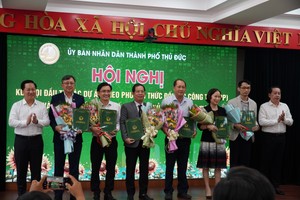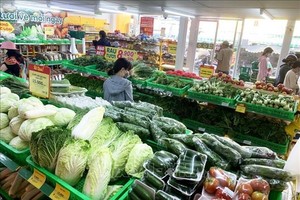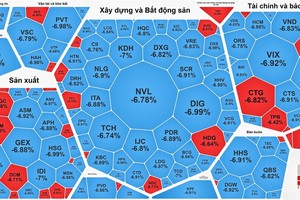
Focus on new policies
Mr. Vuong Dinh Hue, Chairman of the National Assembly, spoke at the opening of the third session of the fifteenth National Assembly of the need to innovate, improve the rule of law, take early initiatives, become more flexible, adapt to new and realistic conditions, closely coordinate with relevant agencies and organizations, work closely with the people, and make firm efforts to complete all tasks well and in time. All the delegates of the National Assembly have the highest state power to consider and approve many important decisions in the fields of legislation, supervision, and important issues of the country in all socio-economic development programs, in order to meet the requirements of development tasks of the country.
At the recent third session of the National Assembly, many bills and resolutions were discussed and approved by the NA delegates, such as the Law to amend and supplement a number of articles of the Intellectual Property Law; Law on Insurance Business; Law on Cinematography; and a Resolution to pilot a number of specific mechanisms and policies for the development of Khanh Hoa Province. Several bills were first discussed by the delegates of the NA, such as the Law on Medical Examination and Treatment; Law amending and supplementing a number of articles of Law on Radio Frequency; and the Law on Petroleum, which are all of great significance in continuing towards a socialist-oriented market economy and also for the overall sustainable development of the country.
Besides discussing many Government reports on the implementation of socio-economic development plans and the state budget, the National Assembly has also considered and decided on investment in five important national transport infrastructure projects under its authority, namely, Ring Road 4 in Hanoi; Ring Road 3 in Ho Chi Minh City; Bien Hoa-Vung Tau highway; Khanh Hoa-Buon Ma Thuot highway; and Chau Doc-Can Tho-Soc Trang highway. All these projects are very important for the socio-economic development of the entire nation. These projects will also stimulate investment demand in regions and localities in the long term as well as in the immediate future, which will help in the process of much needed economic recovery after the damages caused by the Covid-19 pandemic.
The National Assembly also discussed the remaining problems in the implementation of the Planning Law, which is the basis for solutions to all policies. There was discussion on the difficulties and obstacles that are holding up the progress and how to improve the quality of planning work. This is also a concern of many localities, as there have been too many delays in development investment in the past due to planning issues and problems.
The National Assembly permission was also requested to extend the application deadline of Resolution 42/2017/QH14 dated 21 June 2017, on piloting bad debt settlement of credit institutions, and legalization of these regulations in the future. The Law on Credit Institutions needs amending as it is an important basis for the banking industry to coordinate with relevant sectors to continue restructuring credit institutions and dealing with weak banks during the implementation process. Projects on restructuring credit institutions associated with bad debt settlement for the period 2021 until 2025 were also discussed.
People expectations
The two and a half days of questioning and answering sessions from Government members at the meeting raised many issues of people and voters particularly concerned about agriculture and rural development, transportation, banking, and finance. Many issues were brought up such as the case of fake fertilizers, congestion of agricultural products at border gates, bad debts, black credit, bank interest rates, slow project works, sluggish traffic projects, poor quality and slow disbursement of support packages, large budget transfers, many mistakes in management and use of the budget, and increasing loss of tax revenue.
Delegates had frank and constructive discussions with Government members to clarify the current situation, to overcome shortcomings and limitations and improve the quality and performance of most ministries and branches. This will create positive changes and meet the requirements and aspirations of voters and the people at large.
At the end of the third session, people and voters nationwide expect the Government and the National Assembly to focus on resolving inadequacies which have existed for many years, such as the delay in promulgating the legal document system which will quickly introduce legal documents, and the Law to life which will end the situation of borrowing money but not spending for public investment. The latter reduces investment efficiency, especially for key and important national projects such as highways, the Long Thanh International Airport, energy projects, national target programs, and many socio-economic development programs in ethnic minority areas.
The Government needs to overcome mistakes in the management and use of the state budget, practice thrift against waste in the most practical way, strengthen accountability and handle violations in finance and the state budget. Voters also applauded the National Assembly decision to supervise mobilization, management, and use of resources for the prevention and control of the Covid-19 pandemic and the implementation of policies and laws on grassroots health care and preventive medicines.
Compatriots and voters in Vietnam are expecting a change in the implementation of the Resolution on fiscal and monetary policies to support socio-economic recovery and development programs at a scale of VND350,000 bn in the period between 2022 to 2023. They want innovation and development of state-owned enterprises, which hold huge financial and material resources of the country. Vietnam now needs to have strong economic groups that can compete in the regional and world markets in the fields of high technology, telecommunications, energy, oil and gas, and mechanical engineering, among many other important fields.
The Provincial Public Administration and Governance Performance Index (PAPI) report of 2021, which was released on 10 May, shows the percentage of people who carry out administrative procedures related to the grant and change of land use right certificates have received underhand payments upto 40% to 90%, in more than 30 provinces and cities across the country. The business community in Vietnam certainly looks towards the effectiveness of governance and public administration at both the local and central level through the process of administrative reforms and digitization of public services, as well as better control of corruption in the public sector.
























